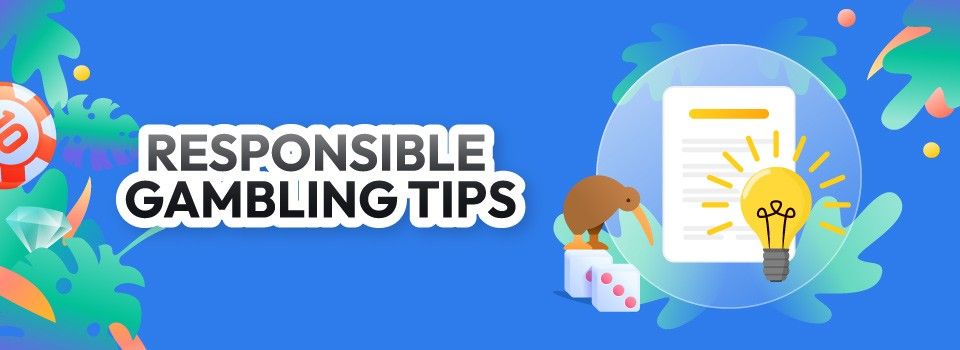Betkiwi’s Responsible Gambling Centre
Welcome to Betkiwi’s Responsible Gambling Centre, our comprehensive hub for promoting safe and enjoyable online gambling and sports betting in New Zealand. We are dedicated to providing valuable resources, expert advice, and essential tools to help you gamble responsibly. At BetKiwi, we made it our mission to foster a safe and transparent environment where players can enjoy their favourite games while making informed decisions and maintaining control of their habits. Whether you’re new to the world of online gambling and betting or a seasoned veteran, we are certain you’ll find at least some useful information here.

What Are Responsible and Problem Gambling Practices?
Responsible gambling refers to having control over your gambling habits, knowing your limits and sticking to them. These limits can be a budget you define yourself, or you can look at the limits the online casino offers to help you control your gambling.
However, there are times when gambling can become problematic. Problem gambling can happen to anyone and occurs when you start losing control, chasing losses, and ignoring financial or betting limits. This will affect not only your balance but also have a profoundly negative effect on your life.
Betkiwi’s Responsible Gambling Pledge
We are dedicated to supporting responsible gambling practices, and every step of the way, we want to ensure that our players are having fun. When playing at online casinos, we encourage our players to take preemptive steps so they can stay in control.
We only recommend online casinos that are just as dedicated as we are to responsible gambling. Our recommended picks allow players to set limits on their accounts, like a deposit limit or a wager limit, along with other tools. Our recommended online casinos are safe gaming spaces licensed by legitimate government bodies like the Malta Gaming Authority and the UK Gambling Commission. These bodies enforce regulations regarding the mandatory gambling tools a casino makes available to players.

Playing Responsibly
It’s essential to know what responsible gambling practices are and what measures to take to ensure you adhere to them. It all starts with finding and recognizing a reputable online casino. After that, you’ll need to make a plan for how to gamble responsibly. Finally, the last step is sticking to your plan and keeping tabs on your playing time and expenditures.
Finding a Reputable Casino
When you visit a casino (land-based or online), your first goal should be to check out its trustworthiness, safety, and fair gaming practices. This can be a bit trickier online, but there are still ways to do it. Any casino worth your time should have visible information on ownership, software providers, fairness of games and payment procedures. Casinos should be audited by professionals, including government agencies and certified independent agencies, and not just internally. eCogra (eCommerce Online Gaming Regulation and Assurance) certification is always a good sign, as this international regulatory body ensures that casinos treat players fairly and uphold fair and responsible gambling practices.
It’s essential to check an online casino’s licence, owners and auditors before considering registering and joining. You can also take a further step and check its player reviews. If many people are unhappy with the casino, that is enough warning for you to stay away. If it’s difficult to find a casino’s certificates on its website, then that casino is not worth your time or money.
Employing Responsible Gambling Practices
- Before you start, set deposit or bet limits. As you play, make sure you do not go over them.
- Bet what you can afford, don’t sacrifice grocery money or borrow money for gambling.
- If you lose, don’t try to make up for your losses. This is called chasing losses and is one of the most common problem gambling behaviours.
- Take breaks regularly. Gambling and online betting can make hours go by quickly, but you need to ensure both your physical and mental health are not neglected. This will also help you make better decisions and keep you in control of your habits.
- Avoid using the casino as your stress reliever. Gambling and betting should be fun activities, but not activities you use to escape real-life problems.
- Don’t gamble when you are under the influence or are emotional, as this can lead to impulsive and poor decisions. Play with a clear head and stable mood to get the most out of it.
- Never prioritise gambling over real-world relationships. Remember, it’s a fun side activity or a hobby, it should not become a life-defining aspect of your personality.
Keeping Tabs on Your Playing History
Online casinos are required to keep a player’s history that a player can refer to at any time. This is incredibly useful to keep tabs on your previous gambling or betting activity and give you an idea if your habits may be slipping out of your control. When logged into your online casino account, you can usually find your player’s history under your account area. Here, you can view your deposits, withdrawals, playing time, and more. If you can’t find your history in your account, try the cashier section for a record of your transactions.

Diagnosing Problem Gambling Patterns
With the rise of online pokies and other popular casino games, it’s easier than ever to find a wealth of titles you could be playing for years. With that comes a problem, though: offline gambling is often a social activity, while online we can get lost in spinning the reels by ourselves, not noticing the time or money we’re spending. Playing casino games can become very addictive, and doubly so when you have a much larger variety to choose from and can play anytime, anywhere, from the comfort of your desktop or mobile device.
You might start noticing a couple of behavioural characteristics when you or someone close to you begins experiencing gambling addiction. These include a flood of emotion caused by gambling, dishonesty or keeping gambling a secret and borrowing money to gamble more than intended. In the following section, you’ll find some of the key signs pointing to problematic gambling behaviour.
Warning Signs of Problem Gambling
Problem gambling can happen to anyone, especially if all advice about responsible gambling is ignored. If you are worried about problem gambling or know someone who may have a problem, here are some of the most common warning signs.
- Spending more time thinking, talking, and planning your time around gambling.
- Increasing the amount spent on gambling over time to get the same level of excitement.
- Trying to control or stop gambling without success.
- Feeling irritable, anxious or depressed when trying to stop gambling.
- Using gambling as a means of escape.
- Chasing losses to try and win money back that has been lost.
- Lying to friends and family to hide how much money or time is spent gambling.
- Not being able to pay bills or asking others for financial help due to gambling.
While support from friends and family is always a good option, an even better one is reaching out to professionals.
Gambling Problem Helpline in New Zealand
There is a New Zealand helpline with specialist services that can assist you if you or someone you know is suffering from a gambling addiction or exhibiting problematic gambling behaviours. Below are the details to contact the trained staff that can help you:
- Gambling Helpline – Available 24/7 via call at 0800 654 655 or text 8006
- Gambling Debt Helpline – You can get them anytime for a debt management specialist, and their contact number is 0800 654 658
- Maori Gambling Helpline – Available 24/7 for a specialist in gambling-related problems at 0800 654 656
- Youth Gambling Helpline – Available 24/7, youth counsellors for youth gambling problems – 0800 654 659
- Pasifika Gambling Helpline – For people in the Pacific community, available 24/7 at 0800 654 657
Other Gambling Organisations in New Zealand
In addition to the above helplines, two other helpful support services can help Kiwis keep their gambling habits in check, ensuring that things stay fun and casual without spiralling into an addiction:
Safer Gambling Aotearoa
Safer Gambling Aotearoa is dedicated to promoting safe gambling practices across New Zealand. They provide a wealth of resources and support services designed to help individuals manage their gambling habits and reduce harmful behaviours. Their initiatives include educational programs, self-help tools, and community outreach efforts aimed at fostering a healthier relationship with gambling. Safer Gambling Aotearoa focuses on prevention, early intervention, and support for those affected by gambling issues.
Problem Gambling Foundation of New Zealand (PGF)
The Problem Gambling Foundation of New Zealand (PGF) is a leading organization committed to addressing gambling-related harm. PGF offers a range of services, including free and confidential counselling, support for individuals and families, and advocacy for policy changes to reduce gambling harm. Their comprehensive approach includes public health strategies, community education, and research to better understand and combat the impacts of problem gambling. PGF strives to create a safer and healthier environment for all Kiwis, not just those with an existing gambling addiction.

Responsible Gambling Tools
Any reputable online casino should provide gamblers with resources to avoid or deal with problem gaming. Here are some key resources that any good operator should offer to ensure that their players will gamble responsibly:
- Daily weekly or monthly deposit limits. The casino won’t allow you to deposit more once you reach this limit until after this period expires.
- Self-exclusion and cool-off periods are features available in many online casinos; they can be set for 24 hours, a week, a month or even longer, and during this time players will have no access to their accounts. Should they wish it, their accounts can also be permanently deactivated.
Setting Gambling Limits
In addition to standard deposit limits, many casinos will allow you to place other specific restrictions on your finances to help keep things from getting out of hand.
- Loss limits: A loss limit restricts the money you can lose over a set time.
- Session limits: You can restrict the time you spend gambling on the platform with a session limit.
- Wager limits: You can set the amount you can wager for casino games and won’t be able to place further wagers once the limit is met for that period.
Self Exclusion
Online casinos offer self-exclusion for those who feel gambling is becoming a problem, and the standard limit tools are insufficient. Self-exclusion will deactivate your account entirely, meaning you can no longer log in or make deposits or withdrawals. The online casino will also stop sending any promotional material to you.
To enter a self-exclusion period, you usually have to contact the customer support team that will action your request within 24 hours. You can set the self-exclusion for up to a year typically, but you can also make it permanent if you wish.
How Can Players Protect Themselves?
In addition to the methods offered by the casinos, there are certain actions players can take by themselves to reduce the risk of gambling addiction and keep their habits in check. These chiefly refer to killing the temptation to gamble in the first place, either by blocking the ability to make payments & see gambling ads or by generally reducing screen time in front of mobile devices, which are often primary catalysts for developing unhealthy gambling habits.
Blocking Gambling Payments
Most payment methods work with players to block gambling transactions. You can contact your bank either in person or online to set up safeguards, which will either restrict or completely prevent making gambling-related payments from your account.
Blocking Gambling Ads
There are also ways to block seeing gambling ads on social media networks like Facebook and YouTube. On Facebook, the ads aren’t removed. However, you can hide them and similar ads by clicking the options menu on the ad and selecting hide or by using the X. Facebook also allows you to adjust ad preferences to see more relevant ads and fewer gambling ads.
You can opt out of seeing gambling ads within the Google Ad Settings on YouTube. When logged into your Google Account, head to your Google Ad Settings and locate Ad Personalisation. If Ad Personalisation is off, you will have little control over the types of ads you see. However, with it on, you can control the type of ads you see. In the “How Your Ads are Personalised” section, scroll down to YouTube, where you can choose to see fewer ads relating to gambling. Select these and confirm your changes. Whilst Google can’t guarantee that you won’t ever see these ads, you should see them far less often in the future.
Limiting Screen Time
Many people get into unhealthy habits thanks to the overuse of modern technology. Mobile phones in particular have made it much easier to gamble uncontrollably, as the entire process takes far less effort and time than purposefully visiting a land-based casino or bookie. One way to generally improve life quality and reduce the chances of being tempted to fall into unhealthy gambling habits is simply making a conscious decision to spend less time on your mobile phone or tablet.
Common Responsible Gambling Terms
Below is a list of the most common terms related to responsible gambling that you should know about.
Responsible Gambling: Engaging in gambling activities in a balanced and informed way, staying within your financial limits. This also includes taking measures to keep gambling fun and enjoyable.
Problem Gambling: Gambling behaviour that negatively impacts one’s life, including personal relationships, well-being, or finances. The inability to control gambling despite these adverse effects is a hallmark of problem gambling.
Gambling Addiction: A mental health condition where an individual cannot resist the urge to gamble, leading to significant negative consequences in their life.
Self-Exclusion: A voluntary program allowing individuals to set limits on their access to gambling services for a specified period. This tool is designed to help individuals manage their gambling behaviours.
Responsible Gambling Tools: Features and mechanisms provided by online casinos to help control gambling activities. Examples include session time limits, reality checks, and setting deposit limits.
Support Services: Organizations and helplines that provide assistance to individuals facing gambling-related issues. These services offer advice, counselling, and resources to help players overcome gambling addiction.
FAQs About Responsible Gambling
We want all our players at Betkiwi to have fun and gamble responsibly. It is important to stay in control, and if at any time you feel that you aren’t, seek help.
What is responsible gambling?
Responsible gambling is about setting limits and sticking to them. It involves setting budgets and sticking to them, never gambling more than you can afford, and avoiding chasing losses. This ensures you’ll have a fun and positive experience, whether you win or lose.
What is problem gambling?
Problem gambling occurs when gambling affects your finances and mental health negatively. If you lose control over your gambling habit, seek help as soon as possible.
Can I track my gaming history?
Yes, you can. Online casinos offer a player history, including transactions made and time spent playing on the casino site.
Can I also keep track of my spending habits?
Yes, of course. Every casino site will keep tabs on how much money you have deposited, won, and lost during your time there. If you want to keep tabs on expenditures across multiple sites, you’ll have to make your own notebook and populate it with information from each site.
Who can I speak to about problem gambling?
If you need help, there are several organisations you can reach out to. Our recommended online casinos offer links to external support like the Gambling Helpline.
What limits can I set?
Depending on the casino, you can control your casino account by placing various limits. These limits include deposit, wager, loss and session limits. You can also opt for a timeout or a self-exclusion period if you feel like you need to step away completely for a while.
How can I tell if someone has a gambling problem?
There are typically signs you learn to notice: the person might constantly be strapped for cash or asking for a loan. They may also tend to be very defensive about how they spend their money or free time and deflect when asked about gambling or sports betting directly. Losing streaks can also severely affect a person’s mood, so irrational anger or depression could also have problematic gambling behaviours as a catalyst. It’s best not to assume such things, though, and try and talk to problem gamblers constructively and without judgement, always putting care for their mental and physical well-being first.

